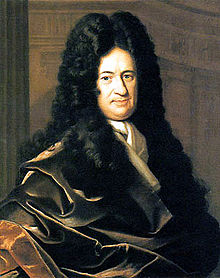Gottfried Wilhelm Leibniz
| Gottfried Wilhelm Leibniz | |
|---|---|
| Theses | |
| Doctoral advisor | Bartholomäus Leonhard Schwendendörffer (Dr.jur. advisor) |
| Other academic advisors |
|
| Notable students | Christian Wolff |
Gottfried Wilhelm (von) Leibniz (/ˈlaɪbnɪts/;German: [ˈɡɔtfʁiːt ˈvɪlhɛlm fɔn ˈlaɪbnɪts] or [ˈlaɪpnɪts];French: Godefroi Guillaume Leibnitz; 1 July 1646 [O.S. 21 June] – November 14, 1716) was a German polymath and philosopher who occupies a prominent place in the history of mathematics and the history of philosophy, having developed differential and integral calculus independently of Isaac Newton.Leibniz's notation has been widely used ever since it was published. It was only in the 20th century that his Law of Continuity and Transcendental Law of Homogeneity found mathematical implementation (by means of non-standard analysis). He became one of the most prolific inventors in the field of mechanical calculators. While working on adding automatic multiplication and division to Pascal's calculator, he was the first to describe a pinwheel calculator in 1685 and invented the Leibniz wheel, used in the arithmometer, the first mass-produced mechanical calculator. He also refined the binary number system, which is the foundation of virtually all digital computers.
...
Wikipedia


